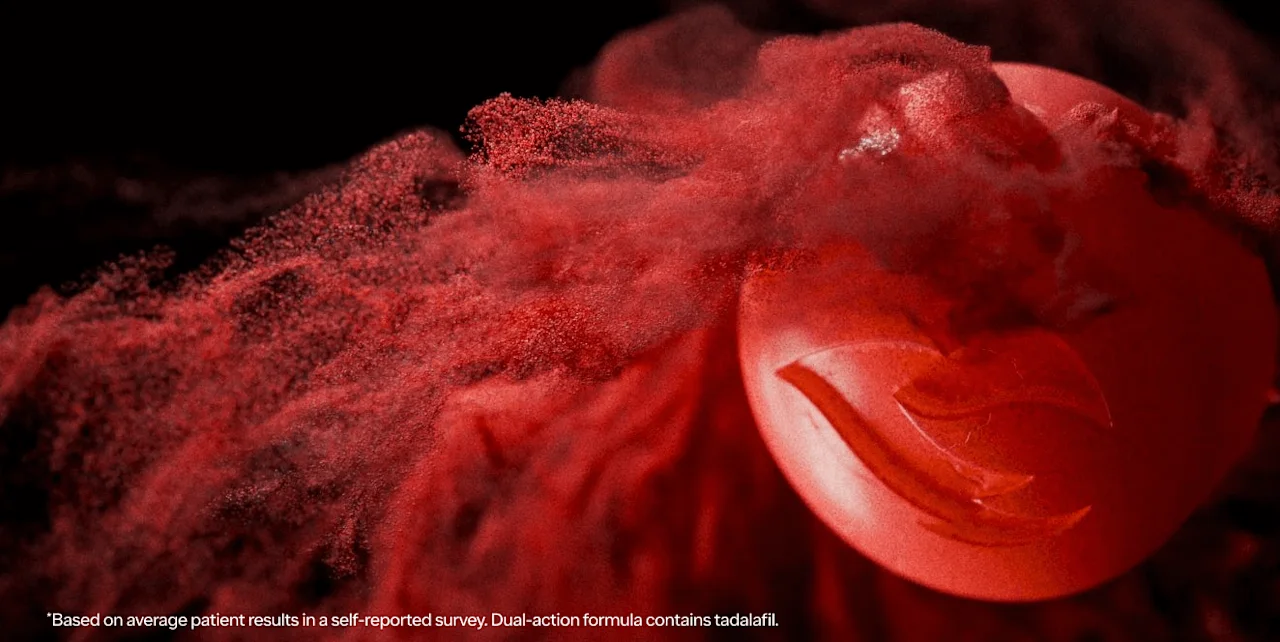Here's what we'll cover
Viagra (active ingredient, sildenafil) is a popular and effective oral medication for treating erectile dysfunction (ED), or the inability to get or maintain an erection sufficient for a satisfying sex life.
Because ED is so common—affecting more than 30 million American men—there are quite a few drugs on the market formulated to help lessen its symptoms (Sooriyamoorthy, 2022). One of these drugs is Viagra. And like all drugs, it also comes with the potential for side effects, ranging from mild to severe, and can interact with some other medications.
Some side effects of Viagra include flushing, headaches, heartburn, priapism, and vision changes. Continue reading to learn about the common and not-so-common Viagra side effects, warnings, drug interactions, and more.
What is Viagra (sildenafil)?
Viagra, and its generic counterpart sildenafil citrate (often referred to simply as sildenafil), is an erectile dysfunction medication that belongs to a class of drugs called PDE-5 inhibitors. PDE-5 inhibitors improve blood flow to the penis, allowing for firmer and longer-lasting erections. But Viagra is not a magic pill. You don't automatically get an erection just by taking it. For Viagra (and other erectile dysfunction medications) to work properly, you need sexual stimulation and arousal to get an erection.
Viagra (sildenafil) side effects
With all medications, there’s always the risk of some side effects.
Here are the most common side effects of Viagra and some more serious (but uncommon) side effects to watch out for.
Common side effects of Viagra (sildenafil)
The most common side effects of erectile dysfunction medications include (Smith, 2022):
Flushing
Upset stomach, heartburn, or indigestion
Headache
Sensitivity to light (objects may seem to have a blue tinge)
Runny nose or nasal congestion
Body aches, including back pain
Temporary color vision changes
Serious side effects of Viagra (sildenafil)
Although uncommon, some people may experience severe side effects while taking Viagra, like (Smith, 2022):
Chest pain
Shortness of breath
Severe headaches
Fainting
Priapism (painful erections that last longer than four hours)
Visual changes (like loss of sight)
If you notice any severe or prolonged symptoms at all, seek medical advice immediately.
Viagra (sildenafil) warnings
People with certain medical conditions may need to exercise caution when taking PDE-5 inhibitors like Viagra.
Viagra can cause a drop in your blood pressure, usually within 1–2 hours after taking it. But it doesn’t happen to everyone. However, if you have low blood pressure, a history of heart attack or heart disease, or other medical issues, talk with your healthcare professional about whether taking Viagra or sildenafil is safe for you (DailyMed, 2017).
Similarly, certain eye conditions like retinitis pigmentosa may increase the likelihood of adverse effects with Viagra, so check with your healthcare provider before using this drug. Viagra may also increase your risk of non-arteritic ischemic optic neuropathy (NAION) in some people–this eye problem can lead to permanent vision loss (Smith, 2022).
Viagra (sildenafil) drug interactions
Before you start Viagra, talk to your healthcare provider about other medications you are taking—both over-the-counter and prescription drugs. Some medicines may increase your risk of side effects if you take them with Viagra.
You should not take Viagra if you are also taking nitrates, which include prescription medications for chest pain (like nitroglycerin) and the recreational drug amyl nitrite (also known as “poppers”). The combination of nitrates and Viagra can lead to a dangerous (potentially fatal) drop in blood pressure (Smith, 2022).
Drugs that affect how your body breaks down Viagra may allow it to stick around longer, increasing the chance of side effects. For instance, the drugs called CYP3A4 inhibitors prevent your liver from getting rid of Viagra. Examples of CYP34A inhibitors include (DailyMed, 2017):
Ritonavir
Saquinavir
Erythromycin
Antifungals (like ketoconazole and itraconazole)
Since one of the side effects of taking Viagra is lower blood pressure, people who take medications to lower high blood pressure (antihypertensives) may find that their blood pressure drops too low if they are also using Viagra.
Alpha-blockers are drugs used to treat high blood pressure (doxazosin) and prostate issues (tamsulosin) like benign prostatic hyperplasia (BPH). This drug class is notorious for causing low blood pressure if taken with Viagra.
Similarly, if you combine Viagra with other PDE-5 inhibitors (like Revatio) or other ED drugs like Cialis (generic name tadalafil) or Levitra (generic name vardenafil), you again run the risk of a dangerous drop in blood pressure (DailyMed, 2017).
Overall, Viagra is a safe and effective treatment for erectile dysfunction. Talk to your healthcare provider about your medical history and concerns, including side effects and potential drug interactions.
DISCLAIMER
If you have any medical questions or concerns, please talk to your healthcare provider. The articles on Health Guide are underpinned by peer-reviewed research and information drawn from medical societies and governmental agencies. However, they are not a substitute for professional medical advice, diagnosis, or treatment.
Viagra Important Safety Information: Read more about serious warnings and safety info.
Cialis Important Safety Information: Read more about serious warnings and safety info.
References
DailyMed. (2017). Viagra- sildenafil citrate tablet, film-coated . Retrieved on Sept. 13, 2022 from https://dailymed.nlm.nih.gov/dailymed/lookup.cfm?setid=a2a9f459-e692-4e85-83b0-a35fbf35e91b
Smith, B. P. & & Babos, M. (2022). Sildenafil. StatPearls . Retrieved on Sept. 13, 2022 from https://www.ncbi.nlm.nih.gov/books/NBK558978/
Sooriyamoorthy, T. & Leslie, S. W. (2022). Erectile dysfunction. StatPearls . Retrieved on Sept. 13, 2022 from https://www.ncbi.nlm.nih.gov/books/NBK562253/












